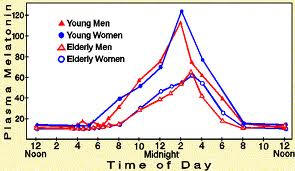New Study Shows Melatonin in Walnuts Protective Against Cancer
and Heart Disease

(SACRAMENTO, CALIF.) SEPTEMBER 13, 2005 - Many
think melatonin is something you can take to fall asleep after long
airplane flights, but scientists are studying how this powerful
antioxidant actually fights diseases like cancer, may impact
diseases associated with aging and likely will allow people to live
healthier lives.
According to Russel J. Reiter, Ph.D., Professor of
Neuroendocrinology at The University of Texas Health Science Center
at San Antonio, "The ingredients in walnuts would be expected to
reduce the incidence of cancer, delay or make less severe
neurodegenerative diseases of aging, including Parkinsonism,
Alzheimer's disease and reduce the severity of cardiovascular
disease.

Dr. Reiter's study found walnuts are a potent source of
melatonin, which is easily absorbed in the body. "When walnuts are
consumed, blood levels of melatonin increase threefold," notes
Reiter. Studies have shown walnuts reduce the risk of heart disease
due to their combination of healthy nutrients, including omega-3
fatty acids and antioxidants. Reiter believes it is the synergy
among the ingredients in walnuts - the combination of nutrients plus
the melatonin that makes them so beneficial. "Melatonin and
omega-3s, both of which are in walnuts, starve cancers because they
prevent the growth of cancer cells. When you take melatonin as a
tablet, you are exclusively getting melatonin. I think the value of
the walnut is the composite of what it contains."
Many diseases of aging, including cataracts, Alzheimer's disease
and Parkinson's disease, have a free-radical component, Dr. Reiter
said. A primary theory of aging states that aging and its associated
degenerative changes are consequences of free-radical damage.
Melatonin acts like a cellular "Pac-Man" gobbling up free radicals
before they can cause harm.
"Melatonin is found in all vertebrates and invertebrates, even in
algae, slime molds and bacteria," Dr. Reiter said. "In 1995, a
couple of publications appeared showing that it also is present in
plants. So, we not only produce it in our bodies, but we eat it in
our diets." Walnuts also contain large amounts of omega-3 fatty
acids, which have been shown to inhibit certain types of cancer and
to be heart healthy. Melatonin also has been shown to inhibit
certain types of cancer.
Eating a good, nutritious diet containing a variety of
nutrient-rich foods is undoubtedly better than trying to get those
beneficial ingredients from supplements. "It's the package deal,"
Dr. Reiter said. "In walnuts it's not only the melatonin that is
healthy, but the other ingredients. It's really the composite of the
nut that makes it healthy, not one ingredient."
Melatonin is perhaps more famous as a sleep aid. The pineal gland
in the brain secretes a little of it during the day and more at
night. The nighttime rise is most important. As we get older, our
nighttime melatonin levels wane, often wreaking havoc on regular
sleep patterns.
Free-radical damage increases as we age, while melatonin
decreases. "I'm not going to suggest that if we boost our melatonin
level we can defer age-related conditions," Dr. Reiter said. "But it
is worth asking this question: Is the loss of melatonin, an
important anti-oxidant, of any consequence in terms of us developing
free-radical-related diseases? In the lab, we can use pure melatonin
to forestall a lot of free-radical damage."
For example, adding melatonin to the diet of newborn rats that
are susceptible to cataracts prevents cataracts from forming, he
observed.
The finding that walnuts contain melatonin is important. "We
don't know the half of it yet," Dr. Reiter said.